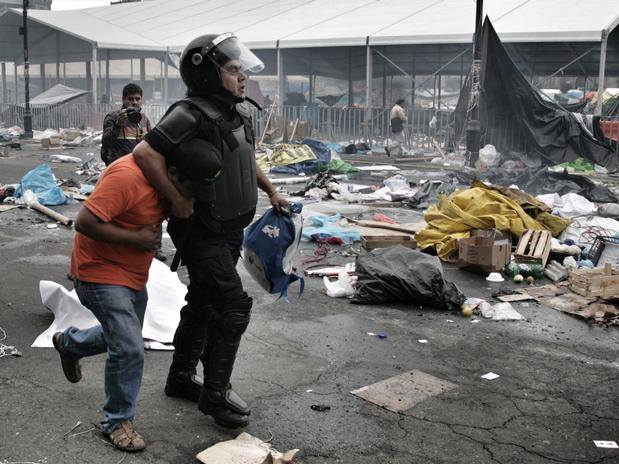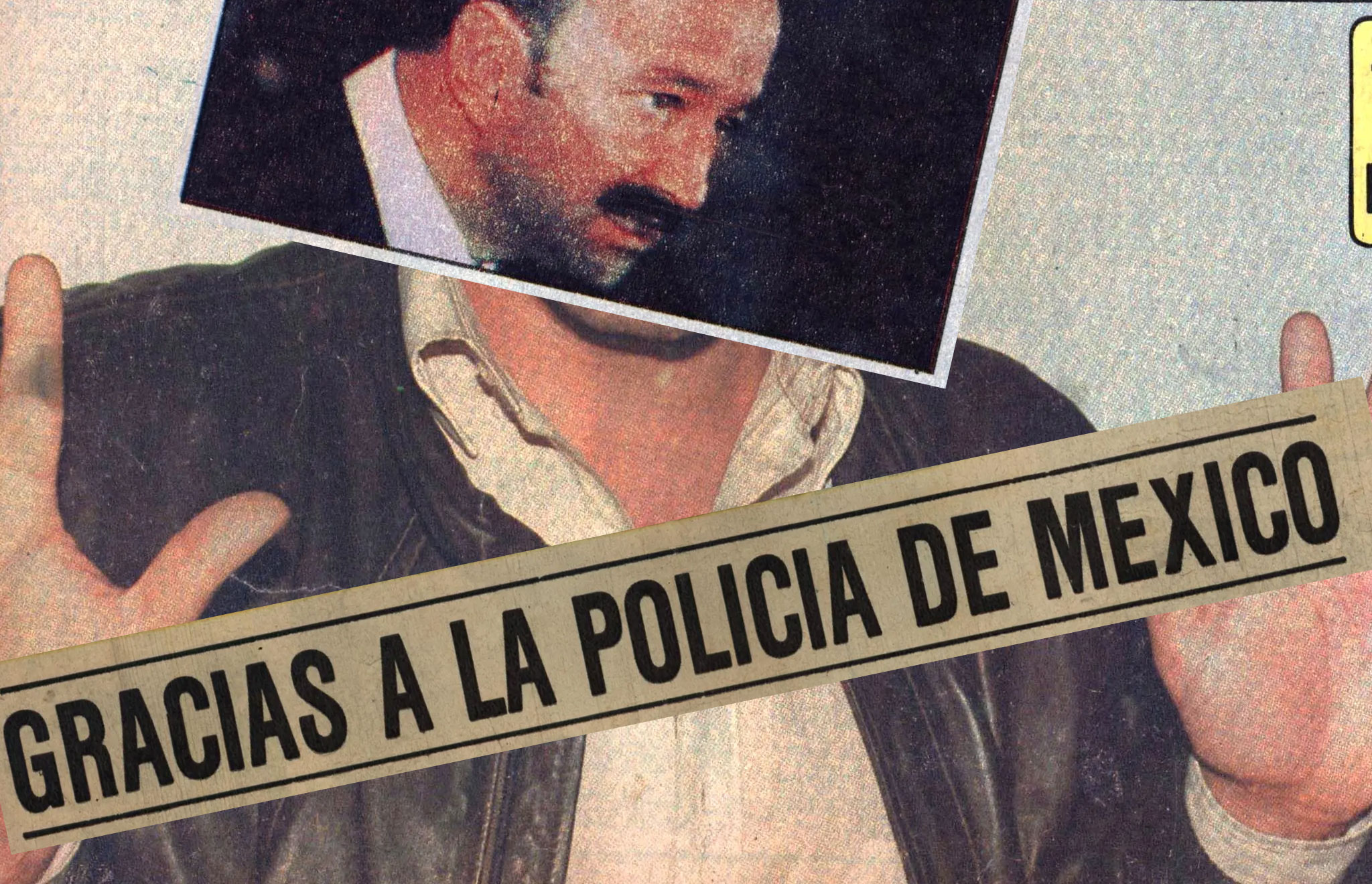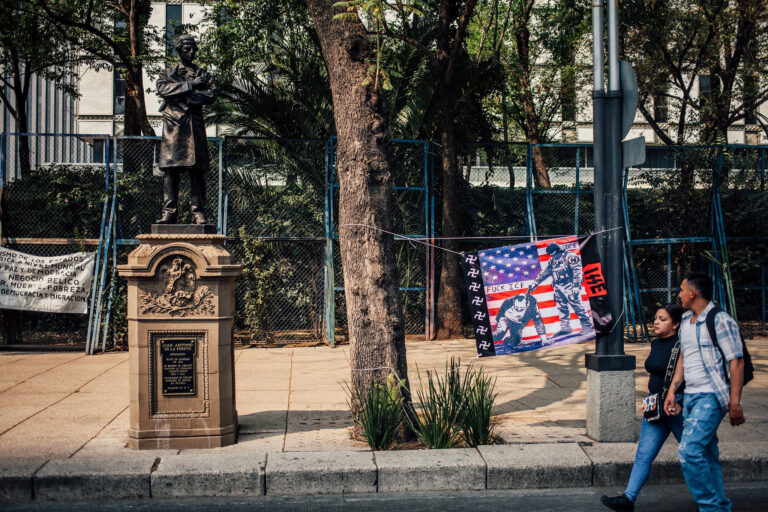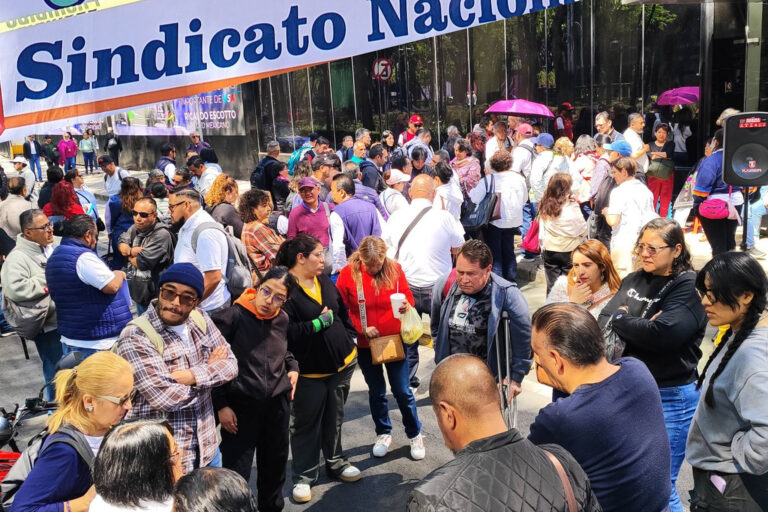MEDIA CRIMINALIZATION
This editorial by Pablo Martínez, a teacher, appeared in the May 24, 2025 edition of La Jornada, Mexico’s premier leftist daily newspaper.
Few union organizations have been as heavily attacked in the media as the National Coordinator of Education Workers (CNTE), which has always occupied an uncomfortable space for the ruling class since its creation in 1979. It is worth remembering that during Felipe Calderón’s six-year term, the CNTE strongly opposed the government’s education policies, particularly the Alliance for Quality Education, signed in 2008 between the federal government and the SNTE.
During Calderón’s six-year term, the CNTE faced a frontal assault after rejecting the so-called “Alliance for Quality Education,” an agreement between the federal government and the SNTE that, under the guise of educational quality, concealed a neoliberal agenda aimed at making teaching jobs more precarious and paving the way for standardized control mechanisms. The government’s response was not negotiation, but repression and disqualification.

Far from fostering dialogue, the government’s response was repression, stigmatization, and the delegitimization of dissenting voices. The pro-government press played a key role by aligning itself with the interests of the government and the SNTE, reproducing narratives that criminalized the teachers’ movement and silenced their legitimate demands.
The political undertones of this confrontation were clearly evident in the close alliance between President Calderón and the then-leader of the SNTE, Elba Esther Gordillo. This relationship, repeatedly denounced by the CNTE, represented a coalition of partisan and business interests that subordinated education policy to ends unrelated to the public interest. Teachers’ leaders such as César Mendoza Toro and Reyes Rojas Cruz denounced that Gordillo used union power to advance particular agendas, to the detriment of the teachers’ profession and public education as a whole.
With Enrique Peña Nieto’s arrival in power, the situation of the teaching profession not only failed to improve, but rather worsened considerably. His administration promoted one of the most regressive educational reforms in recent history, without consulting teachers or considering the actual conditions of schools in Mexico. Under the guise of a supposed teacher evaluation, the reform imposed punitive mechanisms that affected teachers’ job security, subjecting them to standardized tests unrelated to their contexts and promoting a model of individual competition that contradicted the principles of collaboration inherent in public education.
In response to these measures, the CNTE (National Union of Education Workers) responded with a broad resistance movement that included sit-ins, protests, and strikes in various regions of the country.

One of the most symbolic episodes occurred in September 2013, when, after weeks of protests in Mexico City, a massive Federal Police operation evicted teachers from the capital’s Zócalo square, breaking up their protest. This eviction, broadcast live and celebrated by some media outlets, obscured the violence that had been perpetrated: indiscriminate beatings, excessive use of tear gas, the involvement of soldiers disguised as police, and even attacks on journalists. The operation made it clear that the government opted for repression over dialogue, as the tragic events in Nochixtlán in 2016 would later demonstrate.
During President Enrique Peña Nieto’s six-year term, the pro-government press played an active role in criminalizing teachers, promoting narratives that blame teachers for the structural failures of the education system while absolving the truly responsible party: the State. A rather grotesque example was the documentary “De Panzazo,” produced by pseudo-journalist Carlos Loret de Mola, which portrays teachers as the main obstacle to educational progress in Mexico.
Through a biased narrative, the documentary uses manipulated images and carefully selected testimonies to reinforce negative stereotypes, obscuring the legitimate struggles of teachers for better working, pedagogical, and social conditions. This type of journalism, far from providing objective reporting, acts as a mouthpiece for the authorities, contributing to the discrediting of the teaching profession and paving the way for punitive policies disguised as reforms.

With Andrés Manuel López Obrador’s arrival to power, many expected a fundamental change in the relationship between the state and the democratic teaching profession. While his administration repealed some of the most punitive elements of the Peña Nieto reform, the conflicts with the CNTE (National Union of Teachers of the National Education Workers) have not disappeared; the underlying demands (the democratization of the education system, respect for labor rights, and a comprehensive reform built from the ground up) have not been fully addressed. Even worse, certain sectors close to the ruling party have replicated the narrative of previous governments, presenting the CNTE as an irrational and intransigent pressure group.
Today, under Claudia Sheinbaum’s administration, far from ceasing the media criminalization of democratic teachers, it has taken on new forms and new spokespersons. Critics of the previous regime, they now act as squires of unjust policies, aligning themselves with a narrative that discredits and stigmatizes the CNTE. They have been joined by the so-called “YouTubers” aligned with the ruling party, who, with rhetoric laden with simplistic rhetoric and blind loyalty, have contributed to strengthening the perception that teachers’ demands are political whims and not legitimate struggles for fundamental rights. Thus, under the guise of alternative journalism or commitment to the Fourth Transformation, these communicators have joined the long list of those who have historically attacked teachers for daring to demand justice.
-
CNTE Announces 72 Hour National Strike & March to Mexico City’s Zócalo
The class-conscious teachers union will also make “courtesy visits” to the embassies of countries who committed atrocities against Iran, to show their rejection of US imperialism.
-
Yet Another Mexican Citizen Dies in ICE Custody
The unidentified victim is the 9th Mexican citizen to have been killed in ICE detention since the beginning of 2025; this time in Adelanto, California.
-
Culture | Labor | News Briefs
Workers Occupy Culture Secretariat, Demand 13% Wage Increase
2,000 workers have been receiving incomes below Mexico’s minimum wage for over two years.




